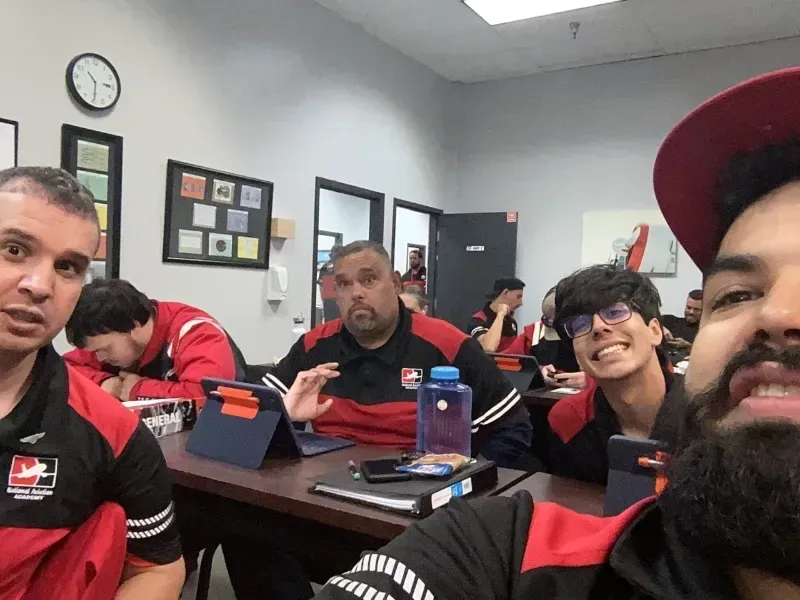What Does It Mean to Audit a Class?


Have you heard of attending classes without the pressure of homework or exams? Auditing a class means enrolling in a college course without intending to earn a grade or credit (no homework or exams).
Students attend lectures and have access to course materials but aren't obligated to attend class or to complete assignments. This blog will explore the ins and outs of auditing a class. We'll discuss its benefits, drawbacks, and the steps involved.
Need additional funds to pay for your courses? Start applying for scholarships today.
Audit Courses: Different from Enrolling in a Regular Course
Auditing a college class means enrolling in a course without the intention of receiving a grade or academic credit. This practice allows students to attend lectures, participate in discussions, and access course materials.
Unlike regular enrollment, auditing does not affect your GPA since no grade is assigned. Auditors may not need to complete assignments, take exams, or meet attendance requirements. The involvement level can vary since some instructors may encourage participation while others may not.
When students attend classes exploring subjects of interest without the stress of grades, they can focus on developing skills for their professional growth.
Create Your Free Profile to Apply for Scholarships Today!Drawbacks to Consider
- No Academic Credit: You won't earn credits towards your degree.
- Limited Interaction: Some instructors may limit the participation of auditors.
- Possible Fees: Some institutions may still charge a fee for auditing.
- Class Participation: Auditors might not be allowed to participate in discussions or submit assignments.
- Access to Materials: Some classes may limit access to certain resources like lab equipment or online portals.
- Fee Structure: While some schools offer auditing at a reduced fee, others may charge nearly full tuition.
Instructors play a crucial role in defining the experience for auditing students. They set expectations regarding participation, access to materials, and any additional requirements. Their approach can significantly vary and influence the benefits you gain from auditing the class.

Class Auditing: Eligibility Requirements
Auditing policies in universities typically outline the process. These policies can vary significantly between institutions and course instructors but they generally address who can audit, how to apply, and any fees involved.
Eligibility to audit often requires students to be in good academic standing. Some schools may also require students to have completed prerequisite courses. It's crucial to check with your institution's registrar or academic advising office to ensure you meet all criteria.
Departmental authorization is usually required to audit a class. This means you need approval from the department offering the course. In some cases, you may also obtain instructor permission or need consent from the instructor. Obtaining this authorization ensures that auditors do not displace regularly enrolled students and that the class can accommodate additional attendees.
There are a few reasons someone might want to audit a class. Personal interest without the desire to graduate is one, while non-traditional students or part-time students might also be interested in auditing. Non-traditional students or returning students have access to funding opportunities that other students may not, such as scholarships for single moms. However and whenever you want to learn, Bold.org supports you with scholarships.
Get Matched to Thousands of Scholarships
Create your Bold.org profile to access thousands of exclusive scholarships, available only on Bold.org.
Create Free ProfileGraduate Students Auditing Classes
Many schools allow "non-matriculating" students to take courses without intending to graduate. Check with your school's Registrar's office to confirm this option.
If you're studying at a private school and the source of your course credit is not a concern, consider the cost-effective options offered by local community colleges or state universities.
Additionally, if you want to learn without earning credit, some professors may allow you to sit in on their classes informally at no cost.
Auditing Classes As a Non-Student
Non-student auditors can attend classes and participate in assigned readings or other methods of information gathering, often after obtaining the necessary permissions and paying any applicable fees. This option provides personal enrichment and professional development opportunities without the pressure of assignments and exams.
For example, Columbia University allows adults not currently enrolled in college to audit a class as long as they meet the eligibility requirements. Those living in specific area codes can attend classes as an auditor for free, and those 65 years of age or older may enroll at a discount as Lifelong Learners. For more up-to-date information about auditing at Columbia, browse their website.
Considerations for Senior Auditors
Auditing a class can be particularly appealing to senior citizens, with many universities offering opportunities for lifelong learning without the pressure of grades or exams. Many institutions provide specific admissions statuses for senior auditors, allowing them to enroll in courses with greater flexibility.
For instance, Utah residents aged 62 and over often benefit from state policies that encourage educational engagement among senior citizens. Depending on the school or university's regulations, these policies may include reduced tuition rates or even free auditing options.
Reduced Cost Options for Local Residents in Specific Jurisdictions
Several public universities extend reduced cost options to local residents, particularly those who meet certain age criteria. This initiative aims to promote community involvement and continuous education.
These programs not only make higher education more accessible but also foster an inclusive learning environment where students receive diverse perspectives can thrive.

How to Audit a Class: A Step-by-Step Guide
Auditing a class in college involves several steps, each crucial to ensure you meet all requirements and gain the most from the experience.
- Steps Involved in the Audit Process
- Identify the course you wish to audit.
- Review the university's policies on auditing classes.
- Seek permission from the instructor.
- Register as an auditor through the appropriate channels.
- Seeking Permission from the Instructor
- Contact the instructor via email or during office hours.
- Explain your motivations for auditing and how it aligns with your academic or personal goals.
- Obtain written approval if required by university policy.
- Registering as an Auditor
- Complete any necessary forms provided by the Registrar's Office.
- Ensure you are aware of the registration deadlines.
- Pay any associated fees that may apply to auditors.
- Understanding Differences in Registration Status
- Recognize that auditors typically do not receive grades or credits.
- Note that audited courses often appear on transcripts with an "AU" designation, which does not impact GPA.
- Be aware of potential limitations, such as restricted access to certain resources or activities within the course.
If you want to gather more information about auditing classes and other tips to navigate college, Bold.org has weekly updated blogs for college students.
Financial Implications of Choosing to Audit a Course
Tuition and Fee Considerations for Auditors
Auditing a class each semester often involves reduced tuition fees compared to enrolling for credit. However, some institutions may charge the same rate as a regular course. Fees can vary widely based on the institution's policies and the specific course being audited. It's crucial to check with your school's registrar or bursar office to understand the exact costs involved.
Availability of Financial Support Options
While traditional financial aid typically doesn't cover audited courses, some schools offer alternative financial support options. Scholarships or grants specifically designed for auditors may be available, although they are less common at most schools.
For those seeking financial assistance, exploring local community programs or sponsorships can be beneficial. Bold.org is a great resource for students to learn how to pay for college, offering strategies and information on available scholarships and grants.

Academic Records and Grading in Audited Classes
Audited courses typically appear on your academic transcript. This inclusion serves as a record of your participation. However, it doesn't affect your full college credit or accumulation or GPA. The presence of audited classes can demonstrate a commitment to learning and exploring diverse subjects, which may be beneficial for academic or career purposes.
Understanding the AU (Audit) Grade Designation
When you audit a class, the grade designation "AU" is assigned. This designation indicates that you participated in the audited course without earning traditional grades or credits. It's important to note that this "AU" designation sets audited courses apart from those where you earn a letter grade.
Exclusion from GPA Calculations
Audited courses do not influence your GPA. Since no grades are awarded, there's no positive or negative impact on your overall academic performance. This aspect makes auditing courses an attractive option for students wishing to explore new fields without risking their GPA.
Including these elements in your academic history provides insights into your dedication to continuous learning. The "AU" grade designation is a clear marker of this pursuit, and its exclusion from GPA calculations allows for academic exploration free from the pressure of graded assessments.

Earning Course Credit Through Challenge Examinations
Auditing a class provides a deep dive into the professor and subject matter without the pressure of grades. However, some students may wish to earn course credit without taking the full course. This is where challenge examinations come into play.
Challenging a Course for Credit through Exams
A challenge examination allows you to demonstrate your knowledge in a specific subject area by passing a comprehensive test. This option is ideal if you have prior experience or knowledge in a subject and wish to bypass the traditional coursework. Successful completion of these exams can result in earning equivalent course credits.
Advantages
- Time-efficient way to earn credits
- Tailored for individuals with extensive prior knowledge
- Cost-effective compared to enrolling in an entire course
Disadvantages
- Requires thorough preparation
- High stakes, as passing the exam is necessary for credit
Testing Services at colleges and universities facilitate these exams. They ensure that:
- Exams are standardized and fair.
- Students meet eligibility requirements.
- Appropriate evaluation methods are in place.
You must typically register with the institution's Testing Services, pay any associated fees, submit work, and schedule your exam. Testing centers provide guidelines and resources to help you prepare effectively.

Frequently Asked Questions Auditing a Class
Are there any financial aid options available for auditing a class?
While regular financial aid typically doesn't cover audited courses, some institutions may offer alternative support options. Check with your school's financial aid office for specific policies and potential scholarships or grants for auditors.
Can I switch from auditing a class to taking it for credit mid-semester?
Policies on switching from audit to credit vary by institution. Some schools allow this change early in the semester, while others do not. Consult your academic advisor or the registrar's office for detailed information on your school's policy.
Can auditing a class affect my GPA?
No, auditing a class does not impact your GPA because you do not receive a grade for the audited course. The course may appear on your transcript with an "AU" designation, indicating it was audited.
Why would someone choose to audit a class?
Students often audit classes to explore new subjects, expand their knowledge, or make informed decisions about their academic paths without the pressure of grades or affecting their GPA.
Find thousands of scholarships at Bold.org and make it a habit to apply frequently!